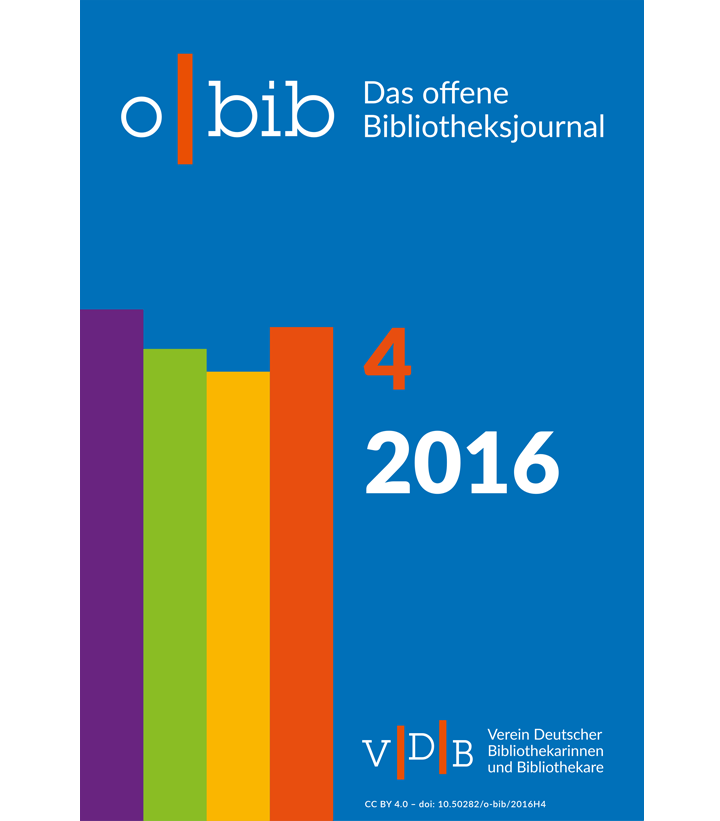Move! UB 2020 – Change an der Universitätsbibliothek Mainz
DOI:
https://doi.org/10.5282/o-bib/2016H4S21-31Schlagwörter:
Universitätsbibliothek Mainz, wissenschaftliche Bibliothek, Organisationsentwicklung, Change ManagementAbstract
Die Universitätsbibliothek Mainz arbeitet intensiv daran, sich als professionelle und aktive Dienstleistungseinrichtung weiterzuentwickeln sowie strategisch stark für die Zukunft aufzustellen. Um diese Vorhaben beschleunigt und nachhaltig umzusetzen, wurde auf der Basis einer seit 2011 konsequent betriebenen Organisationsentwicklung ein breit angelegter Veränderungsprozess begonnen. Unter dem Motto „UB 2020 – Gemeinsam Zukunft gestalten“ wurde das Projekt bewusst prozessfokussiert und themenoffen gestartet. Seit Ende 2014 wurde ein Themenportfolio erarbeitet und die Projektorganisation entwickelt. In der Folge wurden bislang fünf Teilprojekte aufgesetzt, die von einer ausgeprägten Beteiligung der Bibliotheksmitarbeiterinnen und -mitarbeiter getragen werden. Die Teilprojekte bilden verschiedene Perspektiven ab, von der Definition strategischer Ziele oder der Positionierung innerhalb der Universität bis hin zur Gestaltung innovativer Dienstleistungen. Auch die Bearbeitung der internen Themen Entwicklung der Organisationskultur bzw. Aufgabenverteilung zentral / dezentral ist erfolgsentscheidend.
The Mainz University Library strives to further improve its services and to strategically plan ahead for the future. To achieve these goals faster as well as more effectively, we have started to implement several coordinated changes, all based on a development plan that has been consequently pursued since 2011. According to our motto „UB 2020 – Shaping the Future Together“, we deliberately conceptualized this project as a process, without pre-selecting specific areas of activity. Since late 2014, a portfolio of possible topics has been put together and the general organizational framework of the project has been developed. So far, we have come up with five sub-projects in which the library staff is heavily involved. The sub-projects cover various areas, including the definition of strategic goals, the positioning of the library within the university, and the development of new innovative services. Internal questions such as how to develop an organizational culture and how to allocate tasks within the library system will also be crucial for the success
Literaturhinweise
Brandtner, Andreas: Wandel – Krise – Transformation. Herausforderungen für Universitätsbibliotheken am digitalen Informationsmarkt. In: Rafael Ball; Stefan Wiederkehr (Hrsg.): Vernetztes Wissen. Online. Die Bibliothek als Managementaufgabe. Festschrift für Wolfram Neubauer zum 65. Geburtstag, Berlin, Boston: De Gruyter, 2015, S. 63–76.
Brandtner, Andreas: Unfreeze and Move! Veränderungsdynamik und Organisationsentwicklung an der Universitätsbibliothek Mainz. In: O-bib – Das offene Bibliotheksjournal 3/1 (2016), S. 17–31 (https://www.o-bib.de/article/view/2016H1S17-31) (31.07.2016).
Cameron, Kim S. und Robert E. Quinn: Diagnosing and Changing Organizational Culture. Based on the Competing Values Framework, Reading / Mass. u. a.: Addison-Wesley, 1999.
Kotter, John P.: Leading Change: Why Transformation Efforts Fail. In: Harvard Business Review 73/2 (1995), S. 59–67.
Kotter, John P.: Leading Change, Boston / Mass.: Harvard Business School Press, 1996.
Kotter, John P.: Accelerate: Building Strategic Agility for a Faster-Moving World, Boston / Mass.: Harvard Business Review Press, 2014.
Lewin, Kurt: Frontiers in Group Dynamics. In: Human Relations 1 (1947), S. 5–41.
Schein, Edgar: Unternehmenskultur. Ein Handbuch für Führungskräfte, Frankfurt am Main, New York: Campus, 1995.
Schein, Edgar und Gerhard Fatzer: Führung und Veränderungsmanagement, Bergisch Gladbach: Edition Humanistische Psychologie, 2009.
Veröffentlicht
Ausgabe
Rubrik
Lizenz
Copyright (c) 2016 Andreas Brandtner, Stefanus Schweizer

Dieses Werk steht unter der Lizenz Creative Commons Namensnennung 4.0 International.





